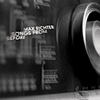Max Richter, "Songs From Before"
 This record is a resounding success. From the first note, the sound is cavernous, and entombed beneath some of the most mournful orchestration imaginable are musical secrets and recycled sonic treasure.
This record is a resounding success. From the first note, the sound is cavernous, and entombed beneath some of the most mournful orchestration imaginable are musical secrets and recycled sonic treasure.
On Songs From Before, Max Richter utilizes sources between half a decade and three centuries old—some as inspiration, some appearing to be submerged reworkings of his own material, and others are well placed shortwave fragments of morse code, chatter, music, and static. The addition of spoken word to this collage could have resulted in a mess. Luckily, Richter is nothing short of an alchemist, in that, while we admire his genuinely heartbreaking music, the literary content and the pristine production, we can still engage emotionally with the end result. The cello, violin and viola, along with Richter's piano, mixing and producing are deft and evocative. Louisa Fuller, Natalia Bonner, Rick Costa, John Metcalfe, Chris Worsey, and Ian Burdge, assist in creating the equivalent of a blank canvas of taut melancholy, onto which the listener may transpose whatever the mind unearths or the heart exhumes.
The chill processional calm of "Song" begins the album strongly with minimal strings, hollow keys, and sporadic depth-charge percussion. Eventually a wave of understated static heralds a change and we are into "Flowers For Yulia" featuring a voice reading from the work of Haruki Murakami. This is a brilliant choice. The balance of accessiblity and complexity in Murakami's work has been noted, and the same is true of Richter. The choice of reader for the few passages of text is probably the biggest risk on this record. Robert Wyatt's voice has always naturally combined a matter-of-fact sadness with a quizical sense of isolation and cheery humanity. For me, this matches, but doesn't overwhelm the power, ambiguity, or meaning of the verse. I hope the recognition factor of Wyatt's presence won't distract other listeners, and when set against clouds of intricate static, the chance is lessened.
"Fragment" features a liquid-into-crystal piano style that recalls Vladamir Costa's romantic soundtrack for the cult film Diva, and as with any object of obsessive desire, is gone all too suddenly. "Harmonium" begins with static that sounds like rain and more verse. That succumbs to a throbbing, meandering, sense of darkness, illuminated by glistening stalactites of shimmering sound-as-light. More deceptively simple orchestral beauty follows (like that's a piss-easy thing to put in the middle of your album) until "Time Passing" blooms into muted and contrasting percussive explosions combined with shortwave chatter. Later, the discussion of sky in the ultra-short "Lullaby" brings to mind Peter Carey's short story The Puzzling Nature Of Blue.
The tracks I mention aren't highlights. When a disc is as consistently satisfying as this one, there's no such thing. Others may say that Songs From Before is too short, too lush, or not difficult enough. Yet each time I listen to this record I feel I enter a secret place, an attic, cave, or well, and either leave something for safe keeping or discover something of value. Of all Richter's recordings, this one may features the least number of notes, but what notes they are! As Rumpole said, "It's the quality of life, Hilda." Rather affirmingly, a Murakami quote which surfaced in a recent brainwashed review of Guitar Realtime Processing is heard here, on "Time Passing", but the quote I'd perhaps use in reference to this record isn't:
"Haven't sensed the sweet breath of summer for long. The sweetness of the waves. The faraway steam whistle. the touch of girl' skin. the lemon smell of hair conditioner. the evening wind. Faint hope. Summer dream... all disperse bit by bit like the bygone days."
samples:



